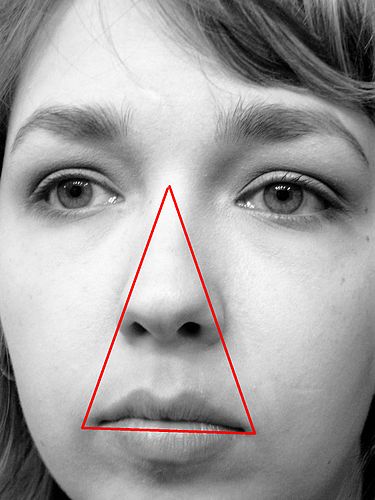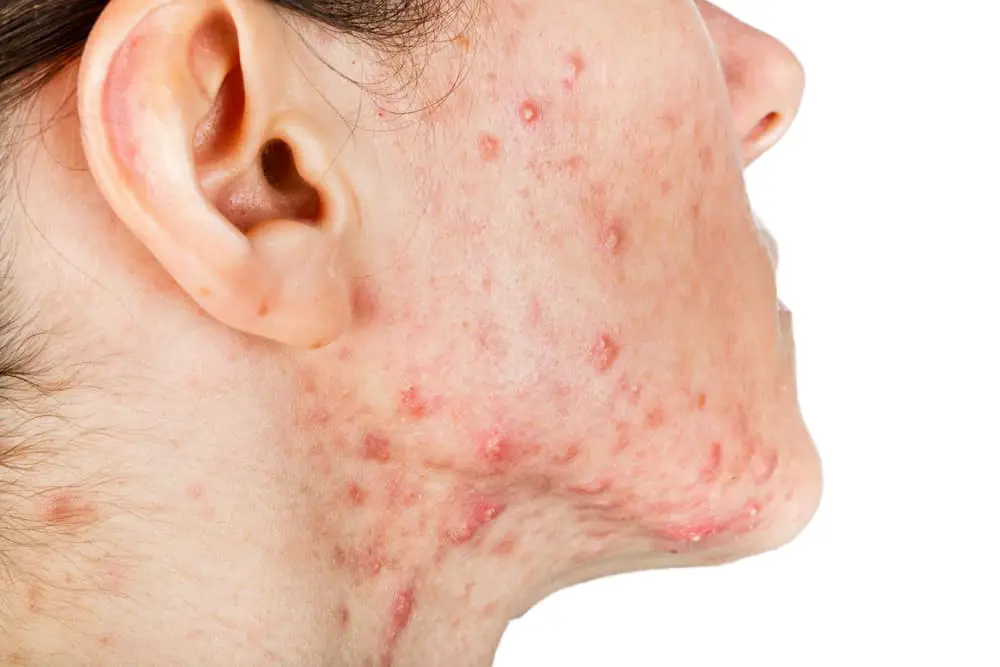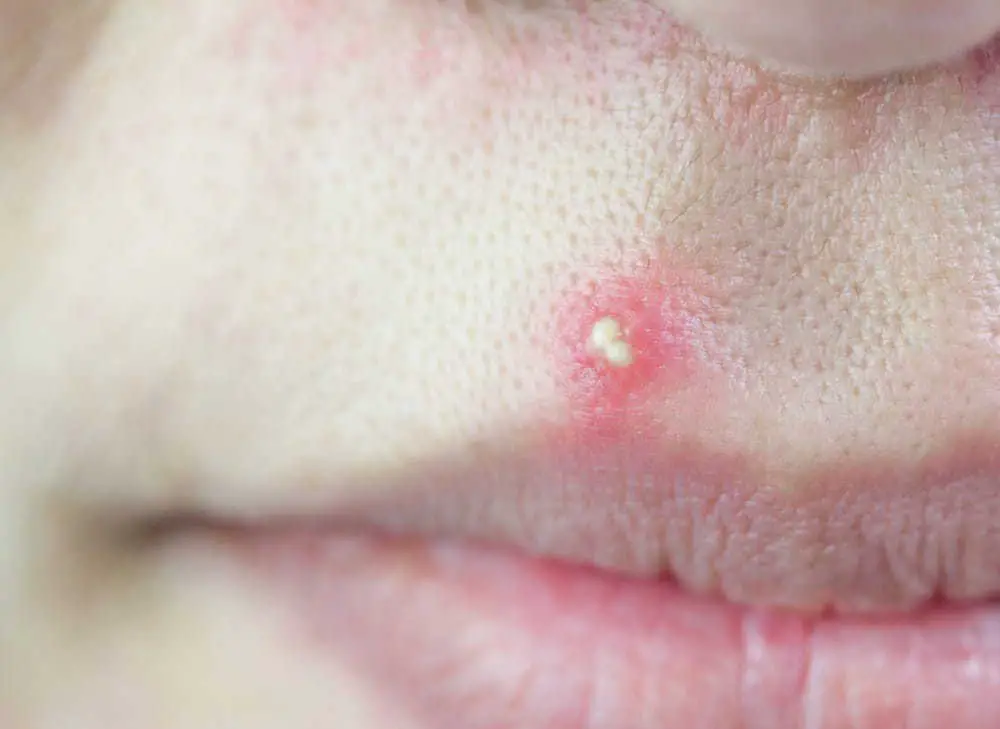Acne is a common skin condition that most people battle at some point in their lives. Although it looks harmless, the process can be mentally, physically, and emotionally exhaustive. While it looks natural, there are arguments that acne can kill you. Can a skin condition that appears harmless indeed cause death?
Can Acne Kill You?
According to a 2015 research, about 633 million people have acne in the world. Thanks to this research, the condition became part of the top ten common diseases in the world. Apart from being an ungainly sight on the face, acne can cause tremendous emotional distress and low self-esteem.
Most commonly, acne is not life-threatening. However, theoretically, a popped acne in the danger triangle of the face on the face can lead to a fatal infection that can kill you. The part of the skin that extends from the corner of the mouth to the nose’s bridges is known as the danger triangle of the face or triangle of death.
The triangle of death is so called because it’s a region where infections can easily spread to the brain, leading to meningitis, encephalitis, or other serious complications.
Infections that occur in this area are notoriously difficult to treat, and they can often lead to death. For example, in the early 1900s an outbreak of meningococcal meningitis caused by Neisseria meningitidis, a type of bacteria, killed many people in the United States.
Fortunately, such outbreaks are rare today. However, if you develop a serious infection in the triangle of death, you may require hospitalization and intensive care.
So, while acne itself is not usually life-threatening, it can lead to serious infections that can kill you. If you have acne, it’s important to keep the area clean and dry to reduce your risk of developing a serious infection.
What Is The Danger Triangle?

The danger triangle of the face is an area of the face that extends from the corner of the mouth to the bridge of the nose. This area is so called because infections that occur in this region can spread to the brain, leading to meningitis, encephalitis, or other serious complications.
The veins from this zone lead to an area in the brain called the cavernous sinus. If you pop a pimple in this zone, and an infection develops (say, due to germs transferred from your hands to the face), the resulting infection can spread till right up to the cavernous sinus. Brain, as you know, is the command center of the whole body. An infection in the brain can mess with other healthy body parts.
If the infection is not treated at the right time, it can lead to half or full paralysis, stroke, and color loss. The list of complications is endless and may in a rare eventuality lead to death. But be assured, the chances of death due to acne are extremely low. Because infections are easily treatable through antibiotics. And when you see a painful infection right in the middle of the face, you would definitely bring medical attention to it.
So, there are two things that you must remember. One, don’t pop a pimple in the danger triangle. Two, if you notice an infection – especially in the danger triangle, don’t ignore it, and consider seeing a doctor.
How Does Popping Acne In The Danger Triangle On Face Kill You?
The nose is one of the body’s first line of defenses against germs since cilia (tiny hairs) that reside within act like a filter, trapping debris and keeping it from entering the breathing passages and, eventually, the bloodstream. Consider that in 2013, a young girl in Arkansas acquired a brain-eating amoeba through her nose while swimming at a local water park.)
Furthermore, bacteria might easily develop in a pimple and travel freely around the nose and mouth area. Furthermore, because that region is so close to our face’s veins, germs there can readily be inhaled or ingested and pose significant threats.
The cavernous sinus is located in the brain, and veins from the Dangerous Triangle lead back to it.
Because there is usually some bacteria on either the hands or the skin, a serious infection can develop due to any one of those factors. If a particularly virulent or resistant strain is present and a pimple is popped, this bacteria can travel via the blood stream into the brain or eye. The danger of this would be even greater in individuals with suppressed immune systems, such as persons living with HIV or organ transplant recipients.
If you pop a pimple within the danger triangle, the skin can become infected, and the infection may spread via these blood vessels. If this happens, the veins that run behind your eye sockets may thicken to contain the infection. The clot puts pressure on the brain and might result in paralysis or death.
The condition is called cavernous sinus thrombosis, and it can be caused by an infection near your eye or temple. The veins that are affected are the ones that travel through the danger triangle on your face.
However, the risks of dying are “extremely low,” according to Dr. Brauer, before you start getting too concerned.
This is due to the fact that these infections are curable with antibiotics, and would have to endure for a long time before reaching your brain. They usually include redness, swelling, soreness, drainage, and bleeding.
While these symptoms aren’t pleasurable, they are certainly apparent, so you’d almost certainly go to a doctor before anything critical occurred.
If you have a pimple in the danger triangle, don’t pop it! See a doctor if it’s red, swollen, painful, or oozing pus. If you have any of these symptoms, you may have an infection and need antibiotics.
Don’t Pop Those Pimples
We have all been there. The question passes through the mind of almost everyone having pimples on the face. It is hardly surprising. It is natural to think – do pimples go away faster if you pop them? And What happens if you accidentally pop a pimple?
Popping acne may increase the healing time of the acne. In the process of popping, the almost dried pus may go inside the skin and starts to swell all over again. Popping acne leaves spots on the face, which will make a face look dull and make the acne noticeable.
It may also leave some lasting spots which may not fade away. Some spots that result from acne may not leave until the face is treated with special treatment.
Moreover, as we saw above, popping a pimple in the ‘danger triangle’ of the face, can cause a lot of trouble.
So, remember, popping acne pimples is a bad idea, and you should resist the temptation to do it.
Asides from the effects of the infection, acne can affect one’s psychology. For example, it can cause bullying, low self-esteem, and depression, as observed in teenagers. The combined effect of such abuse can further lead to complications like depression and contemplation of suicide.
At this age, when social acceptance and social class is common, the pressure to conform to the standards of the society ultimately comes into play.
Some will even avoid going to school, which will result in poor academic performance. Some acne patients will miss job interviews because they think their looks make them worthless. They also lack self-confidence. Such a lack of self-esteem may lead to suicide. So, apart from the physical effects of acne, the mental and psychological manifestations of acne can even trigger suicidal thoughts.
Is It Dangerous To Pop Pimples?
Most acne gets worse through popping or squeezing. Although it looks tempting, popping your pimples does not come without its adverse effects. For example, it can result in permanent spots, permanent scars, painful acne, and infection.

When you pop your pimples, these adverse effects are most likely to happen. As you unconsciously push some of the acne particles into your skin, you can experience more pain, increased inflammation, and scars.
Related post: Acne Vs Pimples: Is There A Difference?
Apart from this, when you have acne, the interaction between the skin and your bacteria often causes inflammation. When you irritate it further, it will aggravate the situation and make the condition worse. Moreover, you risk introducing fresh bacteria from your hand to the acne site when you attempt to pop it.
To deal with a persistent acne breakout, we recommend you seek medical help. There are different techniques for getting rid of persistent acne, many of which your dermatologist will discuss with you. For example, acne extraction is one choice that is explored for treating persistent acne. Although the process takes time and costs much, a dermatologist can extract acne safely through some techniques and sterilized objects.
Acne breakout is ranked in severity; hence, the acne type often determines the method of extraction or treatment. Extraction is one of the safe ways to get rid of blackheads and whiteheads. However, extracting whiteheads and blackheads are not enough to get rid of them. It’s advisable to follow a skin routine after removing them by a dermatologist.
Related post: What Type Of Acne Do I Have? 6 Types of Acne Explained
Tips For Preventing And Treating Acne In Triangle Of Death
- See a doctor if you have any of the following symptoms: redness, swelling, pain, pus drainage. You may need antibiotics.
- If you have a pimple in the danger triangle, don’t pop it!
- Trim your nasal hair rather than plucking it to avoid dangerous infections.
- Keep your hands clean and avoid touching your face.
- Use a mild soap and lukewarm water to cleanse your skin twice a day.
- If you have acne, use a topical acne treatment such as benzoyl peroxide or salicylic acid.
- If the acne is severe, oral antibiotics may be prescribed.
Can Someone With Acne Give You Acne?
Having close contact with people who have acne won’t give you acne. Acne can’t be contracted through ordinary contact with people who have a skin disease. Unlike other infectious diseases, acne cannot be contracted by hanging around the infected person too.
You can peacefully hang out, play, touch someone who has acne. Acne is a skin disease that most people develop on their own, without being infected by someone else.
However, although not transferable, there are some precautions you should take. For example, sharing a makeup brush with someone with acne may result in acne. The reason is that bacteria responsible for acne may be transferred from the skin to the brush. Hence, using the same brush on healthy skin may trigger a breakout. So, do not share a makeup brush with someone with acne to reduce the chances of having a breakout.
Related post: Is Acne Contagious? Let’s Find Out
What Happens If You Leave Acne Untreated?
Acne occurs when oil and dead skin cells mix to form a clog and block the skin pores. However, it can also be a natural occurrence like an indication of puberty. Acne types include blackheads, whiteheads, pimples, etc.
If left untreated, the spots will generally disappear without any treatment. However, in severe acne forms, leaving it untreated can leave lasting scars on your skin. For example, mild acne, especially if caused by puberty, will disappear after a few weeks.
However, nodules, cysts, and other acne types caused by underlying conditions may not disappear quickly. In this case, you should speak to a dermatologist to avoid an ugly outcome.
Generally, the spots caused by acne breakouts are not life-threatening. However, in some cases, a breakout may signal an underlying condition that should be treated.
In essence, while mild acne may not make much difference to your skin, severe acne can leave scars and permanent spots on the affected areas.
You need to be very careful with treating acne and avoid the pitfalls many people end up in. For example, washing the face with a gentle cleanser is an ideal way to manage acne. However, excessive face washing, especially with a harsh cleanser, may accelerate a breakout rate.
Also, consult a doctor when you detect a breakout and avoid much self-medication.
At What Age Does Acne Stop?
Generally, acne starts around the ages of 10 to 13. There are cases of baby acne; however, it is not common. Baby acne occurs within the first few weeks from birth and persists till after a few months. However, it can be severe in an adolescent with oily skin or whose parent had severe acne while growing up. Although there is no science to support the acne gene, acne can be genetic.
In some cases, acne tends to disappear when an individual is in their mid-twenty. In other cases, it may continue even after the mid-twenties. Research states that 3% of individuals that are in their mid-thirties have acne. Both sexes usually have acne, but male teenagers usually have severe cases of acne. However, women usually have moderate acne till their thirties.
Related post: Is Acne A Lifelong Disease? Let’s Find Out
For women, hormonal acne can persist until after menstruation, menopause, or pregnancy. If acne’s underlying cause is not addressed, it may never leave as some people have oily skin even when they are fifty. Some of the things responsible for adult acne are genetic, hormonal changes, stress, allergies, and oil.
Should I Just Leave My Acne Alone?
When acne is popped or squeezed improperly, it may transform into a permanent scar or spot. However, if you let it disappear on its own with a few home remedies, it won’t leave any scars. Severe acne should be medically treated to avoid permanent scars or spots. However, all acne is treatable. It is just about finding a suitable treatment.
Related post: 15 Most Popular Acne Home Remedies: Do They Work?
Also, popping a pimple can make the acne spread from the infected skin to other parts of the skin. Apart from this, squeezing or popping will also delay the healing process of acne.
In essence, when the acne breakout is not severe, leave it and let it run its due course. However, if you suspect a severe form, you should check it out as it could be a symptom of an underlying condition.
So, Can Acne Kill You?
Acne is not a life-threatening condition, except in rare cases. To be safe, it is best to leave your acne breakout alone without popping or squeezing it. Acne patients should abstain from touching their faces to avoid transferring bacteria from hand to the face. When acne or inflammation persists, it is imperative to see a dermatologist.
In this series:
